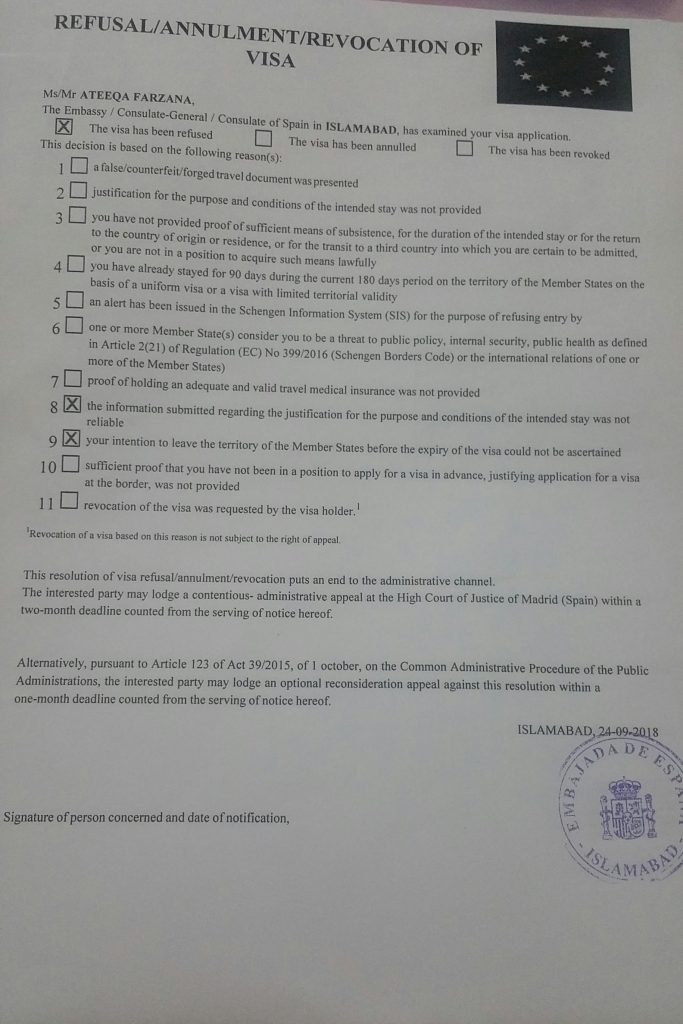

Appealing a visa refusal can be a challenging but potentially rewarding process. It requires meticulous preparation and a clear understanding of the specific reasons for the refusal. Visa refusal can leave applicants feeling frustrated and discouraged, but understanding your options can provide a path towards resolution. This guide will explore the key steps in appealing a visa refusal and will outline potential strategies to maximize your chances of success. This guide will cover a comprehensive analysis of the process. We’ll begin by examining the common reasons for visa refusal, followed by a detailed analysis of the appeal process, strategies for gathering evidence, and valuable tips for consulting with an immigration expert. Throughout, we’ll include real-world examples and case studies to illustrate the practical application of these strategies. We will also address potential pitfalls and offer advice to avoid common mistakes.
Understanding Visa Refusal Notices
Reviewing the Reasons for Refusal
Visa refusal notices often provide specific reasons for the decision. Carefully review these reasons. Identify any ambiguities or errors. If you disagree with the stated reasons, this is your starting point for appeal. Understand the specific legal grounds upon which the decision was made. Often, the notice will contain supporting documentation requirements or details about the evidence that was insufficient. These crucial details will help you understand the specific issues you need to address in your appeal.
Gathering Supporting Evidence
One of the most crucial steps in appealing a visa refusal is gathering evidence to challenge the decision. This might involve providing additional documents, explanations, or testimonies to support your case. If the refusal was based on insufficient financial resources, you might present bank statements, investment records, or evidence of employment. If the refusal stemmed from concerns about your intentions, you might submit letters of support from family members or potential employers.
Potential Legal Issues and Advice
This process can be complex, and the legal implications are significant. Consult with an immigration lawyer or consultant to understand the potential legal issues. They will help you understand the specific laws and regulations related to visa appeals. Your immigration professional will also review all the necessary documentation to ensure that you are fully prepared to present a strong and compelling case.
The Appeal Process: A Step-by-Step Guide
Filing the Appeal
The first step in the appeal process is filing the appeal with the appropriate immigration authority. Follow all instructions and deadlines carefully to avoid delays or rejection of your application. Your immigration lawyer can help you navigate this process. Ensure that all required forms and supporting documentation are submitted correctly and complete within the specified timeframes. Ensure that the application is formatted and complete according to the rules.
Presenting Your Case
After filing the appeal, you will need to present your case to the relevant authorities. Your case depends on accurately presenting your intentions, qualifications, and circumstances. This may involve a detailed explanation of why the initial decision was wrong, including evidence and reasons why your case merits consideration.
Reviewing the Decision and Options
Upon receiving the final decision, thoroughly review it to identify any errors or points of contention. This review is critical to identify areas for improvement and to decide whether further action is necessary. Your lawyer can help you evaluate the decision and understand what further steps, if any, are available or required.
Strategies for a Successful Visa Appeal
Presenting a Compelling Narrative
Your narrative should clearly and concisely convey your intentions, qualifications, and circumstances. Present a story that illustrates your case positively and why you warrant consideration. This is critical to demonstrate your authenticity and credibility. Include any new information, evidence, or facts.
Addressing the Concerns Explicitly
Directly address any concerns that led to the initial visa refusal in your appeal. Your response must be well-researched and articulate. Present credible evidence to show that these concerns are not valid. Be sure to reference specific documents or evidence when addressing concerns in your written appeal.
Understanding and Utilizing Case Law
Visa law can be complex. It’s crucial to understand relevant case law. Case law can establish precedents and demonstrate how similar cases were handled. This can strengthen your appeal and provide support to your argument.
The Role of an Immigration Professional
Seeking Expert Advice
Consulting with an immigration lawyer or consultant can be incredibly beneficial during the visa appeal process. They possess in-depth knowledge of immigration laws and procedures, which is indispensable for navigating the complexity of the system. Seeking expert guidance is crucial for tailoring your appeal to your unique circumstances and increasing your chances of success.
Addressing Concerns and Issues
Immigration professionals can effectively address your concerns and outline the best course of action. They can advise on the most appropriate strategies for your unique situation, including potential weaknesses and issues that may arise during the appeal process. Your professional can provide critical insights into any necessary updates or follow-up actions.
Using their Expertise to Secure Support
Professionals offer invaluable support, which can enhance your appeal process. They assist in managing documents, deadlines, and the overall legal requirements. They can also effectively communicate the need for additional evidence or clarification of the case with the relevant authorities.
Common Pitfalls to Avoid
Misinterpreting the Refusal Notice
Carefully review the refusal notice. Ensure you understand the specific reasons for the refusal. Misinterpreting the notice can lead to an ineffective appeal. Understanding the reasons is crucial for crafting a successful appeal.
Ignoring Deadlines
Immigration authorities have specific deadlines for appealing a visa refusal. Missing these deadlines can lead to your appeal being rejected. Strict adherence to all timelines, dates, and deadlines is crucial.
Presenting Inaccurate Information
Honesty and accuracy are paramount in the appeal process. Providing inaccurate information can severely hinder your chances of success. Ensure that all presented information is accurate and truthful.
Conclusion
Appealing a visa refusal requires meticulous preparation, thorough review of documents, and a clear presentation of your case. Visa appeals involve demonstrating your qualifications, clarifying any concerns, and gathering supporting evidence. The use of a qualified immigration expert is essential. By carefully following these steps and employing effective strategies, you significantly increase your chances of a successful outcome. Remember to consult with a qualified professional to navigate the complexities of visa law.
Conclusion
Ultimately, appealing a visa refusal is about creating a persuasive narrative that demonstrates why your visa application merits consideration. By carefully addressing the reasons for the refusal, providing strong supporting documentation, and adhering to timelines, you substantially enhance your likelihood of a positive outcome. Contact an experienced immigration professional for personalized guidance.
Conclusion
Appealing a visa refusal can be a complex process, but understanding the steps involved and the strategies for success can significantly improve your chances. This guide has covered the intricacies of the appeal process, highlighting the crucial steps for presenting a compelling case and avoiding common pitfalls. Consulting a qualified immigration professional can provide invaluable support and increase your chances of success. Remember, preparing a well-supported appeal that clearly addresses the reasons for the visa refusal is critical. Contact an expert to discuss your specific situation.
Conclusion
Appealing a visa refusal is a challenging but not impossible process. By carefully reviewing the notice, gathering necessary documentation, and addressing the concerns raised, applicants can significantly increase their chances of success. Consulting with an experienced immigration professional is highly recommended for personalized guidance. Carefully addressing the concerns outlined in the refusal notice is critical to crafting a strong appeal. Contact an expert for personalized guidance and actionable steps to pursue a visa appeal.
Frequently Asked Questions
What are the common reasons for visa refusal?
Visa applications are often refused due to insufficient documentation, misrepresentation of facts, or concerns about the applicant’s intentions. Other common reasons include a lack of sufficient funds to support your stay, issues with criminal background checks, or a history of immigration violations. Understanding the specific reason for your refusal is vital for crafting a compelling appeal.
In conclusion, appealing a visa refusal requires meticulous preparation, a clear understanding of the specific reasons for refusal, and a persuasive presentation of your case. By thoroughly reviewing the refusal notice, gathering supporting documents, and consulting with an immigration lawyer or consultant, you significantly improve your chances of success. Remember that every case is unique, and a tailored approach is crucial for effective appeal. If you are facing a visa refusal, don’t hesitate to seek professional guidance. Contact a qualified immigration professional for a consultation to discuss your specific circumstances and explore all available options for appealing your visa decision.